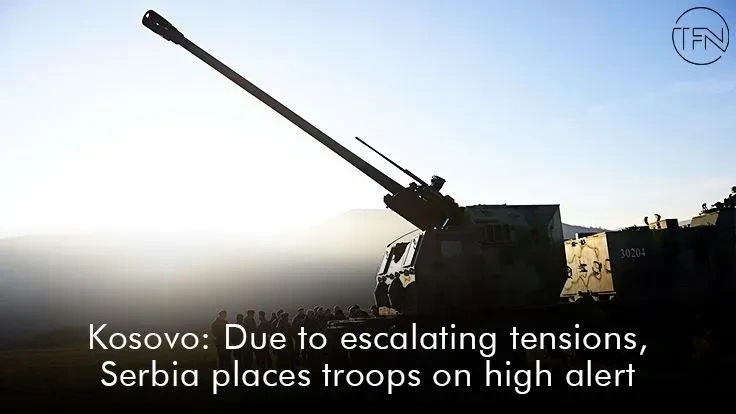
The Serbian army believes it is at its "highest level of military preparation" following weeks of rising tensions between Serbia and Kosovo.
"I will take all means to secure our people and preserve Serbia," said President Aleksandar Vucic.
In reaction to claims in Serbian media that Pristina is preparing to launch "an attack" on ethnic Serb districts of north Kosovo, the threat-making is more prominent than ever.
The Pristina administration has not responded to the accusations.
However, it has already accused Mr. Vucic of engaging in "games" to stir up trouble.
Kosovo, which has a majority-Ethnic Albanian population, broke apart from Serbia following a battle in 1998–1999 The ethnic Serbs who live there oppose Kosovo's claim to independence, as does Serbia.
Kosovo is accused by Belgrade of planning "terrorism against Serbs" in areas with 50,000 individuals of Serb ancestry living there.
The "paramilitary formations" that built roadblocks on December 10 in the Serb-majority areas of north Kosovo, according to Pristina, are the work of Belgrade.
The European Union has been attempting to mediate. The leaders of Serbia and Kosovo are being asked to exercise "maximum restraint," take "rapid action," and make "personal contributions to a political settlement," according to the 27-member bloc.
Belgrade recently increased its armed presence on the border in response to conflicting reports of a gunshot incident that left no one hurt. According to allegations from Belgrade, ethnic Serbs were allegedly attacked, but the claim was refuted by Kosovo officials in Pristina.
Despite this, Serbia appeared to use the reports as an excuse to increase its military presence along the border.
The only clashes so far have been harsh words, but Serbia put its military on battle alert on Monday. If the KFOR roadblocks are not taken down, Kosovo has vowed to take matters into its own hands.
NATO, which has around 3,700 peacekeeping troops in Kosovo, has advised all sides to avoid provocations. For years, its KFOR troops have been crucial to keeping the peace. In Kosovo, where it has a rule-of-law mission, the European Union has issued a warning that it would not tolerate attacks on EU police or criminal activities.
An extremely explosive situation exists. Tensions between Belgrade and Pristina have fluctuated ever since Kosovo unilaterally proclaimed its independence from Serbia in 2008.
However, tensions have reached an all-time high after ethnic Serbs stopped cooperating with Kosovo authorities in recent months.
The spark was, of all things, a disagreement about registration plates. Ethnic Serbs were instructed by Pristina to surrender their still-in-use Serbian-issued license plates and swap them with ones that read "The Republic of Kosovo."
Both parties can understand the symbolism.
Pristina needed to demonstrate its authority. The identity of Kosovo Serbs was visually represented by number plates. Only a few people finished the trade before the deadline.
Pristina's suggestion to impose sanctions on the holdouts prompted the mass resignation of ethnic Serbs from all of Kosovo's national institutions last month. As part of this, more than 600 police officers of ethnic Serb heritage gave in their badges.
Despite a compromise number plate agreement negotiated by the EU, they haven't returned. Instead, Belgrade is requesting that Kosovo keep a promise made in a Brussels agreement from 2013 to grant Serbs some autonomy through a coalition of towns where Serbs make up the majority.
The European Union has pressed Pristina to establish the association. Kosovo's prime minister, Albin Kurti, is adamantly opposed to the idea. He believes it would result in a Kosovo-sized mini-state under Serbian rule.
There was little evidence of a diplomatic breakthrough after a former ethnic Serb police officer was arrested on allegations of attacking the Kosovo force, and thus barricades were put up.
Between Serbia and the northern portion of Kosovo, there are no crossings. Additional barricades were erected on Tuesday morning in North Mitrovica, the largest majority-Serb town in Kosovo.
There are additional outside influences. Kosovo has accused Serbia of acting at Russia's command by stirring up trouble in the Western Balkans to deflect attention from the situation in Ukraine.
Special envoys from the US and the EU have been coordinating talks for weeks. Even yet, they haven't yet been able to convince Kosovo and Serbia to sit down and negotiate.
Pristina is begging NATO peacekeepers to remove the barricades, while Belgrade is pleading with them to protect the Serbs.
The EU's pleas for the greatest caution had a little desperate ring to them. Even though it's the holiday season, this simmering quarrel has little remaining goodwill.

